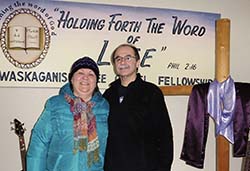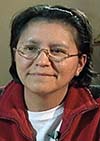ESTABLISHED NATIVE CHURCHES
As a missionary organization our magazine mainly reports on evangelistic efforts – our workers living and serving in Aboriginal communities, witnessing for Christ, discipling, and seeing churches planted.
But what about the Native communities where churches have been established? … places where the missionaries have moved on and local believers are living out their faith in their families, their work, their worship and fellowship meetings?
If you want to know about many of these places, Conrad Flett is someone you should talk with. He and his wife, Florence, live in Prince Albert, but Conrad is often on the road or in the air, visiting these communities and their fellowships. Or he might be out spending quality time with fellowship leaders while hunting moose.
Conrad’s multiple ministry involvements keep him in touch. As an NCEM missionary, he is host for our Tribal Trails TV outreach and travels with our recording team, interviewing program guests in widespread locations. The believers and fellowships he connects with may have affiliation with various missions and denominations. It’s his involvement with Native Evangelical Fellowship of Canada (NEFC) that we asked him about when we sat down with him recently.
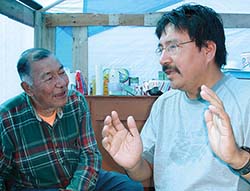
Conrad Flett (r.) with the late Jack Barkman, who organized an annual summer family camp in northwestern Ontario.
NEFC is a fellowship of 17 churches located across Canada, from Bella Coola, BC to Moose Factory, Ontario and Waskaganish, Quebec, on James Bay. Conrad serves as Chairman of the NEFC Board. Along with Board meetings and many phone calls, he especially enjoys personal visits to fellowship leaders’ homes and Native Christian gatherings.
Conrad tells how his connection with NEFC started in his childhood. Along with several years growing up in Winnipeg because of his father’s health, Garden Hill (Island Lake, northeast Manitoba) is home, and the NEFC church there has been a strong influence in his life. Though he didn’t commit to following Christ till an adult, as a kid he has great memories of attending NEFC conferences held in Winnipeg every summer.
As a new believer, Conrad says it was the church elders at Garden Hill who taught him much. They not only modeled the Christian life for him, they taught him to recognize Bible truth, and not to stumble on other teachings not true to the Word.
A RADIO CONNECTION
Interestingly, Conrad says that radio ministry had a lot to do with him joining the NEFC Board. CJTL-FM, owned by NEFC, was licensed back in 2008 but was at somewhat of a standstill, he says. (You can read more about CJTL on the NEFC website, and listen online at www.cjtlradio.com) With his TV ministry experience working with technicians, Conrad felt he had something to offer.
NEFC is a denomination with an evangelistic mandate, so outreach through radio fits well. Radio has always been a passion for these Native churches, says Conrad. Local churches have often used radio to reach out to their communities, buying air time and broadcasting their services. NEFC’s vision to have its own radio network connecting churches together, and broadcasting the Gospel into needy places is being fulfilled, and continues to expand.
Of course, finances are necessary for an organization to operate. Conrad explains that, for the most part, NEFC pastors raise their own salaries through employment or other financial support from outside their churches. Their communities recognize the need for good workers, says Conrad, so these men don’t have trouble finding jobs. Most of these pastors are “home grown,” and some have had Bible training outside.
NEFC leaders take serious this being an indigenous ministry. “But we don’t want to be isolated. We want to work with others,” says Conrad. “Financial gifts and volunteer help from God’s people anywhere are always a big blessing.”
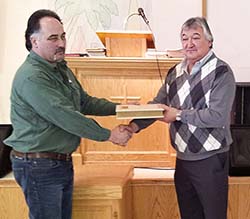
NEFC Exec. Director, Kene Jackson, officially welcomes pastor Silas Sinclair and Niiyahk Bible Chapel (Oxford House, MB) as an NEFC member.
SOLID FOUNDATION
Local fellowships use their own resources to carry on their ministries. A great example of this was witnessed in April when NEFC Executive Director, Kene Jackson, and Conrad Flett traveled via NCEM aircraft and pilot Albert Heal to eight communities. One of their stops was a community in northwestern Ontario where two men are giving leadership to a local fellowship.
Missionaries had previously served there, but had moved out years ago. The last several years the fellowship leaders have been in contact with NEFC. The group has a church building but, due to flooding, it had become unusable. Conrad and Kene had heard these men talk about their people’s good memories in that building, and what Christ had done in hearts there.
This year when the NEFC team stopped in, the building had just been repaired. It involved a major fix, with metal beams taken from an old school installed under the floor. Local men with welding skills completed the job.
“We had a great service there in April,” says Conrad. “It’s up to them if their group joins NEFC,” he says. “It’s about fellowship. And we’ll keep encouraging them even if they aren’t NEFC members. Arnold Flett (pastor at Garden Hill) has visited there, just a 15-minute flight away. Of course, you’d need an airplane for that,” Conrad adds.
When asked how to best pray for these fellowships across Canada, Conrad concludes, “Pray for the pastors. Some of them feel all alone. They have their people, but maybe don’t have an elders board. They still need and welcome God’s people from far away to come and help them – not church planting missionaries, but ones who will come alongside. These pastors know what they need for their fellowships to thrive. They will tell the assisting workers what kind of help they need.”
…………………….
NEFC BEGINNINGS
In the late 1950s the idea of having a loosely knit fellowship of Native Christians across Canada was born.
This paved the way toward an organizational framework which would be adopted in 1959 at a meeting of First Nations Christian leaders in Island Lake, Manitoba.
In 1968 its Bylaws & Constitution were written, and in 1969 the name Native Evangelical Fellowship was chosen, with its charter granted in 1971.
…………………..
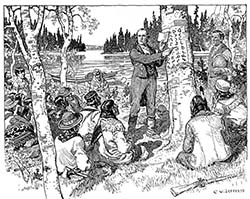 NATIVE CHURCHES EARLIER
NATIVE CHURCHES EARLIER
Through evangelical missionary effort and God’s blessing, notably the 1950s & 60s saw people come to faith in Christ and churches spring up in northern Native communities from Hudson’s Bay across to the Rockies. The work had really begun long before that.
In the 1800s the Hudson’s Bay Company, for business reasons, had Methodist missionaries accompany their workers on fur trading travels and at trading posts. As these evangelical missionaries taught the Gospel, many northern First Nations people found salvation.
James Evans is one of the better known of these Methodists. Based in Norway House, Manitoba, he translated the Bible and taught the Cree people to read and write their own language.
Sadly, in following decades, gaps in missions strategy resulted in fewer Native men becoming equipped to pastor their churches. And liberal theology infiltrated schools that had been training missionaries.
“So a lot of these communities have had an evangelical influence since the 1800s,” says Conrad Flett. “Unfortunately, over the last 20 or 30 years that Christian influence is less evident. New roads to previously isolated communities, fall-out from abuse at residential schools, new media technology and its effects haven’t helped. Still, most of our NEFC churches are in this ‘Bible belt,’ ” he notes.
…………………….
NEFC MISSIONARIES
Along with pastors, NEFC has missionary workers. One of them is Rose Buck who is also an NCEM associate member. (She receives her support through NEFC.)
Rose assists at Riverside Bible Church at The Pas, Manitoba, and is involved with NEFC publications. This summer she has also been busy preparing for the NEFC Conference, held at the The Pas, July 11-14.
Financial support for Rose and other NEFC workers, or NEFC general expenses, can be sent to:
NEFC
PO Box 4096, Redwood Postal Outlet
Winnipeg MB R2W 5K8
Phone: 204-669-7389
Email: nefc@mymts.net
Website: www.nefc.ca

(from Northern Lights issue #548)


